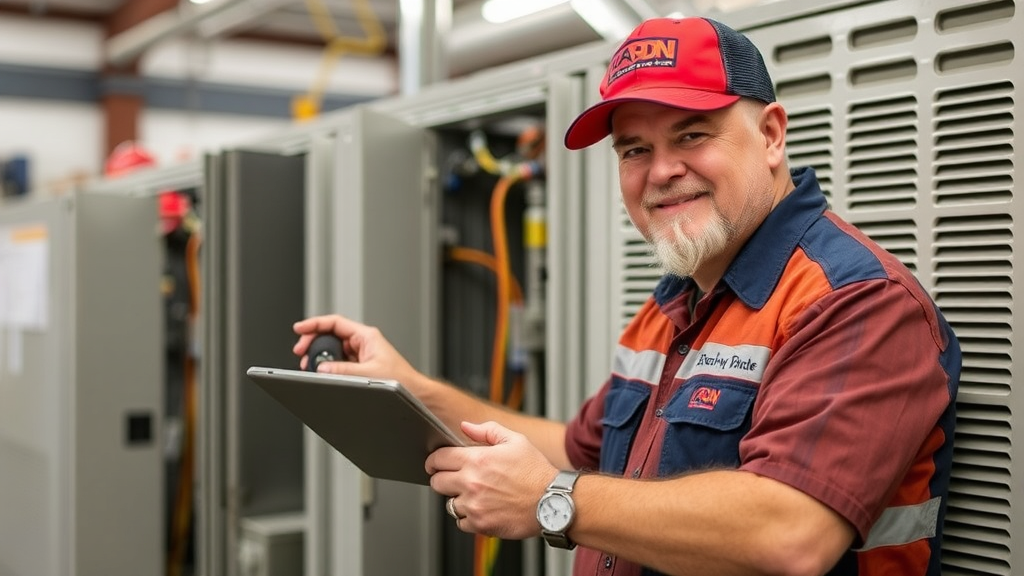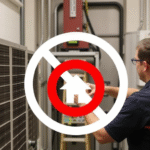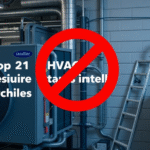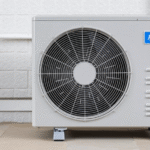The Role of an HVAC Veteran in Leading Technician Training Initiatives at HARDI
As the HVAC industry continues to evolve, the importance of well-trained technicians escalates. In this landscape, having an experienced HVAC veteran leading technician training initiatives at HARDI marks a significant milestone. This seasoned professional brings invaluable insights and practical experience that can shape the future of HVAC training.
HARDI, the Heating, Air-conditioning & Refrigeration Distributors International, is known for promoting excellence in the industry. By recruiting a veteran who has spent years in the field, HARDI not only gains a leader but also a mentor who understands the intricate challenges technicians face. This individual possesses a wealth of knowledge that can bridge the gap between theoretical training and real-world application.
One of the primary roles of this HVAC veteran is to revamp the training curriculum. By integrating the latest technological advancements and industry best practices, the revamped program aims to ensure that trainees are well-equipped with the skills necessary to succeed. Key areas of focus might include:
- Understanding modern HVAC systems and their operation
- Hands-on training with tools and technologies
- Best practices for customer service and communication
- Safety protocols and regulations
- Energy efficiency and sustainability practices
Another significant aspect of technician training initiatives involves continuous professional development. The HVAC veteran will emphasize lifelong learning, encouraging technicians to stay updated on emerging technologies and techniques within the industry. This could involve setting up certification programs or partnerships with technical schools to create a pipeline of skilled labor.
To ensure that these training initiatives are effective, the HVAC veteran will likely employ a multi-faceted approach that could include:
- Hands-On Workshops: Real-world scenarios and simulations will allow technicians to practice their skills in a controlled environment.
- Online Learning Platforms: These tools can provide technicians with flexible learning opportunities, accommodating various schedules.
- Mentorship Programs: Pairing less experienced technicians with industry veterans fosters knowledge transfer and confidence building.
- Feedback Mechanisms: Implementing processes for gathering feedback from trainees and instructors will help refine programs continuously.
Furthermore, the HVAC industry faces a growing demand for skilled technicians. With the increasing complexity of HVAC systems, training becomes imperative to meet both consumer needs and regulatory requirements. This is where the leadership of a veteran at HARDI translates into tangible benefits, including:
| Benefit | Description |
|---|---|
| Increased Competency | Technicians gain the expertise to handle advanced HVAC systems. |
| Higher Job Satisfaction | Well-trained technicians are more confident and efficient in their roles. |
| Enhanced Customer Experience | Technicians equipped with comprehensive training can deliver superior service. |
| Industry Reputation | Recognized training initiatives can enhance HARDI’s standing within the HVAC industry. |
Beyond technical expertise, the veteran’s role involves nurturing soft skills that are equally crucial. Excellent communication and customer service skills can differentiate a good technician from a great one. The HVAC veteran can impart techniques that enable technicians to interact positively with clients, ultimately leading to increased customer loyalty.
The inclusion of an HVAC veteran leading training initiatives at HARDI is a strategic move that acknowledges the essential relationship between training and performance. Through forward-thinking training programs, the industry can ensure that skilled technicians are ready to meet the demands of today’s HVAC environment.
For more information about configuration and improvements in technician training, visit HARDI’s official website. Here, you can discover resources that can significantly impact your knowledge and skills in HVAC.
Additionally, you can explore other organizations like The ACHR News, which often shares industry tips and training content to help HVAC professionals stay ahead. connect with training education providers such as HVAC Classes to further your education in this dynamic field.
Having an HVAC veteran at the helm of training initiatives at HARDI not only prepares technicians for their roles but also promotes a culture of excellence in the HVAC industry. This commitment to training can lead to long-term success for technicians, employers, and ultimately, clients.
Benefits of Enhanced Technician Training for the HVAC Industry
Technician training holds immense significance in the HVAC (Heating, Ventilation, and Air Conditioning) industry. With technology evolving rapidly, enhanced training programs are essential for meeting current demands. These programs contribute to improved efficiency, higher safety standards, and overall better service quality. When technicians receive comprehensive training, they become more capable of tackling challenging situations, leading to substantial benefits for both professionals and customers alike.
One of the primary advantages of improved technician training is the increase in energy efficiency among HVAC systems. Well-trained technicians understand the nuances of system design and operation. They are adept at installing, maintaining, and repairing these systems, ensuring they perform at their optimal levels. This not only reduces energy consumption but also lowers utility bills for homeowners. The Air Conditioning, Heating, and Refrigeration Institute (AHRI) provides resources to enhance technician knowledge about energy-efficient practices.
Another key benefit is enhanced safety measures. Poorly trained technicians can lead to serious accidents during installations or repairs. Comprehensive training programs equip them with critical safety protocols, significantly reducing the risk of workplace accidents. Adhering to safety standards not only protects the technician but also provides peace of mind for customers knowing that their HVAC systems are in capable hands. The Occupational Safety and Health Administration (OSHA) offers guidelines that training programs can incorporate to keep technician safety a priority.
Enhanced training also leads to better customer service. A knowledgeable technician can communicate effectively with clients, explaining issues clearly and offering practical solutions. This builds trust and fosters long-term relationships. Customers feel more satisfied when their service request is handled professionally, and they are more likely to recommend the technician to others. A happy customer can contribute significantly to a company’s reputation and future business opportunities.
Additionally, ongoing education benefits the HVAC industry by reducing repair times and minimizing costs. Technicians familiar with the latest technologies can diagnose problems quickly and efficiently. They are also less likely to require costly callbacks since they can address issues effectively on the first visit. This directly translates to higher productivity levels and increased profitability for companies.
Real-world scenarios into training programs can enhance learning. Technicians can participate in hands-on workshops that simulate common HVAC problems. These workshops provide practical experience and help technicians apply their knowledge in real situations. This experiential learning component is crucial for reinforcing concepts that can otherwise be forgettable in traditional lecture settings.
A great approach to progressive training is through mentorship programs. Pairing experienced technicians with novices fosters knowledge sharing. Mentors can pass along best practices and insights that only come from years in the field. This one-on-one support system nurtures skill development and creates a more knowledgeable workforce.
Here are some key elements that illustrate the advantages of enhanced technician training:
- Improved system diagnostics and troubleshooting skills
- Increased energy efficiency of HVAC installations
- Enhanced safety awareness and compliance
- Higher customer satisfaction rates and retention
- Lower operational costs and minimized repair times
- Development of a knowledgeable, well-rounded workforce
New technology and tools in training also plays a vital role. Virtual reality (VR) and augmented reality (AR) offer immersive learning experiences for technicians. They can practice complex repairs and installations in a simulated environment without risks, thereby enhancing their confidence and skill set before working on actual units.
Industry associations such as the Heating, Air-conditioning & Refrigeration Distributors International (HARDI) are pivotal in promoting enhanced training initiatives. These organizations provide resources for ongoing education and certification, which are essential for maintaining high standards within the HVAC field.
Ultimately, investing in technician training will yield long-term benefits for the HVAC industry. From improved efficiency and safety to increased customer satisfaction and reduced costs, every aspect of HVAC service is elevated through proper education and training. As the industry continues to evolve, adapting training programs to meet emerging technologies and standards will remain crucial for success.
Innovations in HVAC Training Techniques and Technologies
The HVAC industry continues to evolve, and with this evolution comes the need for continuous improvement in technician training methods. New innovations are emerging to enhance learning experiences for aspiring HVAC technicians, making training more effective and engaging.
Virtual Reality (VR) Training
One of the leading innovations in HVAC training is the use of virtual reality. This technology allows technicians to simulate real-world scenarios without the risks associated with live equipment. Trainees can practice troubleshooting, system installations, and even complex diagnostics in a safe virtual environment.
Benefits of VR training include:
- Immersive Learning: Trainees can interact with HVAC systems as if they are handling them in real life.
- Enhanced Retention: Experiential learning has been shown to improve knowledge retention.
- Cost-Effective Simulations: VR training can reduce the need for expensive equipment and materials.
Online Learning Platforms
With advancements in technology, online learning platforms have became essential for HVAC training. These platforms provide flexibility and accessibility, allowing students to learn at their own pace. Comprehensive courses often include videos, quizzes, and interactive content that caters to different learning styles.
Key features of effective online HVAC courses include:
- Self-Paced Learning: Students can tailor their studies around their personal schedules.
- Interactive Assessments: Quizzes and hands-on assignments help reinforce concepts.
- Expert Instruction: Access to experienced professionals who can offer guidance and insights.
Mobile Learning Applications
Mobile applications are gaining traction in technician training. These apps allow learners to access training materials on-the-go, empowering them to study anytime, anywhere. Many apps also include features like:
- Video Tutorials: Step-by-step guidance for various HVAC tasks.
- Augmented Reality: Visual overlays to assist with installation and repairs.
- Resource Libraries: A wealth of technical manuals and documentation available at the fingertips of trainees.
Mentorship and Peer Learning
Mentorship programs into training can greatly enhance the educational experience. Pairing novice technicians with seasoned professionals helps to foster a culture of learning. Mentorship promotes:
- Real-World Insights: Novices gain valuable knowledge from experienced technicians.
- Networking Opportunities: Building relationships within the industry can open doors for future employment.
- Skill Development: Personalized guidance helps trainees refine their skills more effectively.
Hands-On Workshops
Even with technological innovations, hands-on experience remains crucial in HVAC training. Workshops that incorporate live demonstrations provide a perfect blend of theory and practice. Participants can:
- Familiarize Themselves with Tools: Gain comfort using various HVAC tools and equipment.
- Troubleshoot Real Problems: Learn to diagnose and fix problems under expert supervision.
- Apply Knowledge: Transition classroom lessons into practical application, solidifying their learning.
Telematics in Training
The integration of telematics in HVAC systems is an emerging trend that can also influence training. Technicians can learn how to assess system performance remotely through data analytics. This not only improves diagnostics but also allows trainees to understand the importance of data in modern HVAC applications.
Some benefits include:
- Enhanced Predictive Maintenance: Understanding how data can be used to anticipate equipment failures.
- Real-Time Monitoring: Learning to interpret data for optimal system performance.
- Improved Troubleshooting Skills: Data-driven insights can refine a technician’s problem-solving techniques.
As the HVAC sector embraces these innovations, training programs are becoming more interactive and relevant. Organizations like HARDI are working to evolve the way technicians are trained, ensuring they are better equipped to meet industry demands. With a blend of technology and traditional methods, the future of HVAC training looks promising.
The landscape of HVAC technician training continues to change rapidly. With new tools and technologies in play, future technicians can look forward to a rich and engaging learning experience. Investing in these training innovations will not only enhance workforce preparedness but will also ensure that the HVAC industry thrives in the coming years.
The Importance of Skilled Technicians in Maintaining HVAC Systems
In today’s rapidly evolving world, the role of skilled technicians in maintaining HVAC systems is more vital than ever. As we rely on heating, ventilation, and air conditioning (HVAC) systems for comfort and air quality, having trained professionals ensures these systems operate efficiently and effectively.
Every home and business relies on an HVAC system to create a comfortable environment. Whether it’s cooling you down in the summer or warming you up in the winter, these systems need regular maintenance to perform at their best. Here’s why skilled technicians are essential in maintaining them:
Essential Skills and Knowledge
HVAC technicians require a broad set of skills and knowledge including:
- Understanding of complex HVAC systems
- Knowledge of safety protocols
- Ability to diagnose and repair issues quickly
- Familiarity with current technology and tools
- Awareness of energy efficiency practices
Preventive Maintenance
Regular maintenance by skilled technicians helps prevent small issues from escalating into costly repairs. They can:
- Identify potential problems early
- Clean and replace filters for better air quality
- Check refrigerant levels for optimal cooling
- Ensure proper airflow throughout the system
Energy Efficiency
One of the primary concerns for homeowners and business operators is energy efficiency. Highly trained HVAC technicians help in several ways:
- Recommend efficient HVAC systems that lower energy costs
- Inspect ductwork for leaks that waste energy
- Offer tips on adjusting settings for maximum efficiency
According to the U.S. Department of Energy, maintaining your HVAC system can save you up to 30% on energy bills. Regular inspections and upkeep are key elements to achieving such savings.
Compliance and Safety
Working with HVAC systems also involves compliance with local and federal regulations, especially concerning environmental safety. Technicians ensure that:
- All refrigerants are handled correctly
- Systems adhere to energy efficiency codes
- Air quality standards are met to ensure health and safety
Neglecting these aspects can lead to significant fines and health hazards, making the presence of skilled professionals crucial in the HVAC landscape.
Technician Training Programs
Organizations like HARDI (Heating, Air-conditioning & Refrigeration Distributors International) are essential in fostering the next generation of skilled HVAC technicians. Their training initiatives focus on:
- Hands-on experience with modern HVAC technologies
- Developing critical thinking in troubleshooting
- Understanding customer service and communication
The HVAC industry is continuously evolving. With the introduction of new technologies, skilled technicians need to stay updated. Continuous education and training are vital in keeping technicians well-versed with the latest tools and systems.
The Impact of Skilled Technicians
The impact of skilled technicians extends beyond just keeping the systems running. They contribute to:
- Improving indoor air quality
- Enhancing the lifespan of HVAC systems
- Supporting environmentally-friendly practices
- Boosting the overall performance of systems
Investing in skilled HVAC technicians is, therefore, an investment in the comfort and safety of our homes and workplaces. When HVAC systems are well-maintained, everyone benefits.
| Benefit | Impact |
|---|---|
| Improved Energy Efficiency | Lower energy bills and reduced environmental impact |
| Increased System Lifespan | Prolonged use without major repairs |
| Healthier Air Quality | Reduced allergens and pollutants |
In maintaining HVAC systems, skilled technicians play a fundamental role. Not only do they ensure systems function properly, but they also contribute to energy savings, safety compliance, and improved air quality. For anyone relying on heating or cooling in their space, investing in trained professionals is a must, ensuring a comfortable and safe environment.
Strategies for Engaging HVAC Technicians in Continuous Learning
Keeping HVAC technicians engaged in continuous learning is essential for maintaining a skilled workforce in today’s fast-paced industry. Here are some effective strategies to foster a culture of learning among your HVAC team.
Utilizing Online Training Platforms
Online training platforms provide HVAC technicians with access to a wide range of courses and resources that can fit their schedule. This flexibility is key to encouraging participation. Here are some benefits:
- Self-paced learning allows technicians to balance work with their educational pursuits.
- Courses often cover the latest technologies and practices, keeping skills sharp.
- Online platforms typically offer certifications, enhancing credibility and career prospects.
For more on effective online training in HVAC, check out ICC-ES for robust courses.
Implementing Peer Mentoring Programs
Setting up peer mentoring can help technicians learn from one another while fostering teamwork. Both experienced and newer technicians can gain from this structured interaction.
- Veterans can share real-world experiences that cannot be found in textbooks.
- It reinforces a sense of community, encouraging mentorship between team members.
- This technique can increase retention rates, as technicians feel more connected and supported.
Mentorship programs can require a bit of planning but yield significant long-term benefits.
Organizing Hands-On Workshops
Hands-on workshops are a dynamic way to engage technicians. They allow for practical application of skills learned in the classroom or online.
- Workshops can introduce innovative technologies and installation techniques.
- These sessions may include troubleshooting in real-time, preparing technicians for unexpected problems.
- Engagement often leads to better retention of information as technicians actively participate.
Workshops can also be a great setting for team-building, improving morale and cooperation within the team. Consider reaching out to manufacturers or local HVAC suppliers for collaboration.
Continuous Feedback
Feedback is crucial in any learning environment. Regularly gathering input from technicians helps to gauge the effectiveness of training initiatives.
- Surveys can reveal which training programs are most beneficial.
- Open forums allow technicians to voice their opinions on what they would like to learn next.
- Using feedback to improve training initiatives shows employees their input is valued.
Enhancing your training approach based on technician feedback demonstrates your commitment to their professional development.
Leveraging Industry Trends and Innovations
Being in tune with industry trends can inspire technicians to pursue further learning. Information sessions focused on new technologies, regulations, or sustainable practices can keep teams engaged.
- Offering presentations with guest speakers can provide fresh insights.
- Highlighting case studies or success stories showcases the practical benefits of continuous learning.
- This can also lead to discussions about innovative solutions, encouraging a mindset of continuous improvement.
For the latest HVAC trends, consider visiting HARDI for valuable resources.
Setting Personal Development Goals
Encouraging technicians to set personal development goals creates a sense of ownership over their learning journey.
- Goal-setting can be short-term or long-term, tailored to personal interests.
- Regular check-ins on these goals can motivate technicians to stay on track.
- Providing incentives for achieving these goals can further bolster engagement.
Creating a supportive environment where HVAC technicians feel motivated to invest in their continuous learning is vital. Use these strategies to engage your workforce effectively. For more resources and updates on HVAC training initiatives, follow ACCA and NATEX.
The Future of Technician Training in the HVAC Sector
The HVAC industry has taken a significant leap forward, especially in technician training. With technology evolving rapidly and the demand for skilled HVAC professionals increasing, organizations are focusing on enhancing training methods to ensure technicians are well-prepared for the future. The introduction of knowledgeable leaders in technician training, like a seasoned HVAC veteran joining HARDI, brings valuable experience and insight to these initiatives.
The landscape of technician training in HVAC is shifting towards a more comprehensive and hands-on approach. This change is necessary due to several factors:
- Technological Advancements: New technologies like smart HVAC systems require technicians to be adept not just in mechanical skills but also in digital literacy. Training programs need to incorporate these elements to keep up with industry standards.
- Skill Gap: There is a noticeable skill gap in the HVAC workforce. As veterans pass on their expertise, new programs must ensure that technicians have practical skills and theoretical knowledge to meet workplace demands.
- Safety Standards: As regulations become more stringent, technicians must be trained on the latest safety protocols. This is crucial to ensure compliance and reduce workplace accidents.
To address these changes, organizations are reshaping their training initiatives. Here are some strategies that are being implemented:
- Online Training Modules: Many programs have begun offering online courses that allow technicians to learn at their own pace. This flexibility enables workers to balance learning with their job responsibilities.
- Hands-On Workshops: Practical workshops are crucial in HVAC training. Tutors can simulate real-world scenarios, helping technicians gain experience without the pressure of an on-site job.
- Mentorship Programs: Pairing inexperienced technicians with industry veterans can enhance learning outcomes. These mentorships allow novices to ask questions and receive valuable insights.
Furthermore, the move towards virtual reality and augmented reality in training is incredibly revolutionary. These technologies can provide immersive experiences, allowing technicians to practice in a simulated environment before working on actual HVAC systems. Such advanced methods ensure that trainees are well-equipped with necessary skills.
Collaboration within the industry is another fundamental aspect shaping the future of technician training. Stakeholders, including HVAC associations, educational institutions, and manufacturers, are joining forces to create unified training standards. This strategy not only streamlines training but also enhances the overall credibility of the HVAC workforce.
This also paves the way for consistent programs across states and regions, which is essential for extending workforce mobility and addressing the national skill gap. Platforms like HARDI are at the forefront of this initiative, developing standardized curricula that can be widely adopted across training facilities.
The impact of these training initiatives on hiring practices cannot be overstated. As the HVAC industry recognizes the importance of well-trained staff, hiring standards are becoming stricter. Employers are now looking for candidates who have completed comprehensive training and can demonstrate their skills effectively. This shift is beneficial for both employers and employees, as it creates a more capable workforce.
In addition to practical skills, soft skills are gaining recognition. Technicians should also develop their communication, problem-solving, and customer service skills. By integrating these elements into training programs, organizations will produce not only skilled technicians but also professionals who can enhance customer relationships and overall service quality.
Building awareness around these changes is crucial in attracting new talent. HVAC training programs need to market themselves effectively to reach out to potential students. Ensuring young people understand the career opportunities available in the HVAC sector will aid recruitment efforts significantly.
As organizations prioritize the future of technician training in HVAC, the industry will likely become more efficient, safe, and conducive to growth. The involvement of seasoned veterans leading these initiatives, such as the HVAC veteran joining HARDI, indicates a bright future where emerging technicians are not just ready for today’s challenges but are also poised to lead tomorrow’s innovations.
With these transformative changes, technician training in the HVAC sector not only prepares workers for immediate job requirements but also lays a solid foundation for sustainable career growth. The concerted efforts in developing a skilled HVAC workforce will undoubtedly benefit the industry as a whole.
How HARDI is Shaping the Next Generation of HVAC Professionals
The HVAC industry continues to evolve, presenting both challenges and opportunities for those entering the field. Organizations like HARDI (Heating, Air-conditioning, Refrigeration Distributors International) play a vital role in molding the future of HVAC professionals. Through innovative training programs and resources, HARDI is committed to equipping the next generation with essential skills and knowledge.
Comprehensive Training Programs
HARDI offers an array of training initiatives, designed to enhance the skills of technicians and installers. The training programs cover various essential topics:
- Fundamentals of HVAC
- Advanced installation techniques
- Energy efficiency practices
- Customer service skills
- Safety protocols
These programs are tailored to meet the needs of both newcomers and seasoned professionals, ensuring everyone can benefit from continued education.
Partnerships with Educational Institutions
By collaborating with trade schools and technical colleges, HARDI is bridging the gap between education and practical experience. Partnerships enable students to gain hands-on training while studying theoretical concepts. This approach is crucial for achieving a balanced understanding and expertise in the HVAC sector.
The Role of Industry Veterans
Often, experienced technicians and industry veterans are brought in to lead training sessions. Their firsthand knowledge adds invaluable insight to the learning process. HVAC veterans can share real-world experiences that enrich the classroom environment, helping students prepare for challenges they may face in the field.
Access to Updated Resources
HVAC technology constantly changes, with new tools and techniques being developed regularly. HARDI provides its members with access to the latest resources, including:
- Webinars and seminars featuring industry leaders
- Online courses covering new technologies
- Technical guides and manuals
This steady stream of updated information ensures that students and professionals are well-versed in the latest advancements.
Encouraging Mentorship
Mentorship is key to personal and professional growth. HARDI encourages experienced professionals to take on mentorship roles. This connection fosters a supportive community where less experienced technicians can seek guidance and advice. The exchange of knowledge between generations can catalyze exciting growth within the industry.
Promoting Certifications
Certifications can significantly boost an HVAC professional’s credibility and job prospects. HARDI emphasizes the importance of obtaining formal certifications. These recognized credentials demonstrate a commitment to the trade and help technicians stand out in a competitive job market. Additionally, HARDI assists individuals in navigating the certification process, making it easier for them to achieve their professional goals.
Commitment to Diversity and Inclusion
Diversity and inclusion are essential elements for fostering innovation in any field. HARDI actively works toward creating an inclusive environment that welcomes individuals from various backgrounds. This commitment not only enriches the learning experience but also ensures a broader range of perspectives in the HVAC community.
Building a Community of Support
Through events, forums, and social media platforms, HARDI helps create an interconnected community of HVAC professionals. Networking is vital in any industry, and HARDI provides countless opportunities for individuals to make connections that could benefit their careers. Being part of a community allows professionals to share experiences, collaborate on projects, and find job opportunities more easily.
Outreach Programs
In addition to training for current professionals, HARDI actively engages with students through outreach programs. These initiatives encourage young individuals to consider a career in HVAC. By presenting the diverse career options available and demonstrating the industry’s impact on energy efficiency and environmental sustainability, HARDI is planting the seeds for future generations.
The HVAC industry is swiftly changing, and organizations like HARDI are at the forefront of shaping the next generation of HVAC professionals. Through comprehensive training programs, partnerships, mentorships, and a commitment to diversity, HARDI ensures that new recruits are well-equipped to face the challenges ahead. As the demand for skilled HVAC technicians grows, HARDI’s efforts will undoubtedly pay off, paving the way for a bright future in the industry.
Key Takeaway:
The HVAC industry is continuously evolving, and the recent appointment of a seasoned HVAC veteran to lead technician training initiatives at HARDI (Heating, Air-conditioning, and Refrigeration Distributors International) signals a significant step forward in addressing the industry’s challenges. One of the primary roles of this veteran will be to enhance technician training, which is crucial for ensuring that HVAC professionals possess the necessary skills and knowledge to excel in their jobs. Enhanced training programs not only elevate the technical capabilities of technicians but also improve customer satisfaction and operational efficiency within the HVAC sector.
The benefits of innovative training techniques cannot be overstated. By incorporating modern technologies such as virtual reality, simulation-based training, and online modules, HVAC training can become more engaging and effective. These innovations allow technicians to learn in a real-world context, fostering a deeper understanding of complex systems. As the complexity of HVAC systems increases, skilled technicians are more vital than ever. They play a crucial role in diagnosing issues, performing maintenance, and ensuring systems operate efficiently, which ultimately contributes to energy savings and environmental sustainability.
To encourage continuous learning, strategies need to be adopted that speak to the motivations of technicians. This might include hands-on workshops, mentoring programs with industry veterans, and access to online resources that cater to various learning styles. Recognizing the importance of sustaining an informed workforce, HARDI is committed to shaping the next generation of HVAC professionals through these educational initiatives.
Looking ahead, the future of technician training in the HVAC sector will likely focus on adaptability and technological integration. As the industry demands more qualified professionals, HARDI’s commitment to evolving training programs is set to propel HVAC technicians into a new era. This approach not only addresses current workforce shortages but also prepares technicians for future challenges and advancements in HVAC technology. Ultimately, the goal is to establish a robust pipeline of skilled professionals capable of sustaining and enhancing the HVAC industry’s reputation and efficacy for years to come.
Conclusion
As the HVAC industry continues to evolve, the appointment of an HVAC veteran to lead technician training initiatives at HARDI marks a significant turning point for both current and future professionals in the field. By tapping into years of experience, this leader is set to enhance training programs that not only boost the expertise of technicians but also elevate the overall standards within the industry.
Enhanced training opportunities bring multifaceted benefits, from improved efficiency to increased customer satisfaction. With innovations in training techniques and technologies, such as virtual reality and hands-on simulations, technicians gain access to practical learning experiences that mirrors real-world challenges. This approach not only hones their skills but fosters a culture of excellence, essential for maintaining complex HVAC systems.
Skilled technicians play a key role in ensuring that HVAC systems operate optimally, affecting energy consumption and indoor air quality. The importance of their knowledge cannot be overstated, as they are integral to both troubleshooting and preventative maintenance. HARDI is committed to engaging these professionals in a journey of continuous learning, recognizing that ongoing education is crucial in keeping pace with industry advancements.
Looking ahead, the future of technician training in the HVAC sector appears promising. HARDI is poised to shape the next generation of HVAC professionals, creating pathways for learning that inspire young talent and seasoned technicians alike. By embracing innovation and emphasizing the value of skilled labor, HARDI not only enhances the individual technician’s career but also contributes significantly to the sustainability and growth of the HVAC industry itself. The fusion of experience and modern training techniques ensures that the HVAC workforce is well-prepared to meet tomorrow’s challenges.







Leave a Reply